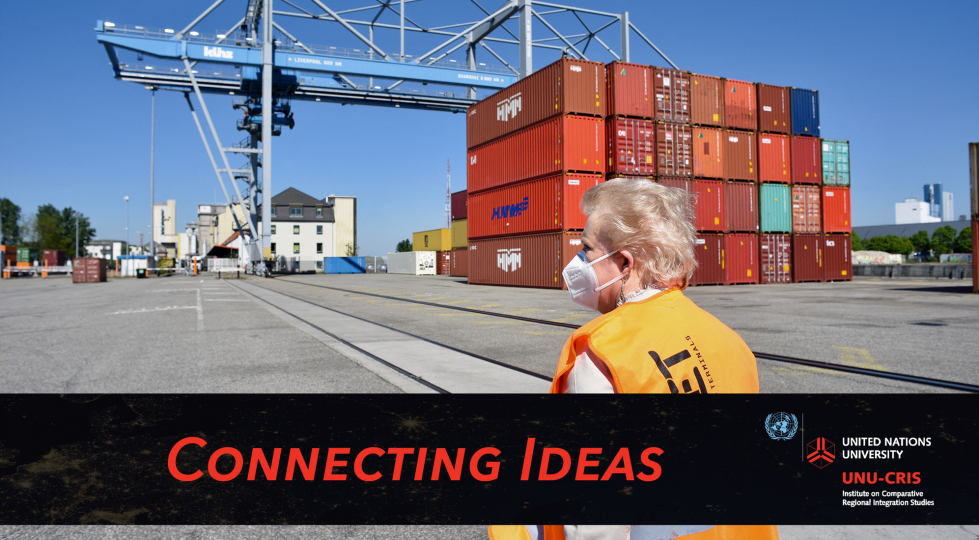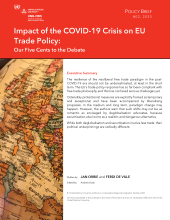Will the COVID-19 Crisis Herald the End of Neoliberal Globalisation and the European Union’s Free Trade Doctrine?


Jan Orbie
UNU-CRIS Professorial Fellow and Director of the Centre for EU Studies / Associate Professor in the Department of Political Science at Ghent University

Ferdi De Ville
Assistant Professor at the Centre for EU Studies
30 April 2020 | #20.17 | The views expressed in this post are those of the author and may not reflect those of the UNU or UNU-CRIS.

This blog is based on a policy brief published by UNU-CRIS.
Read "Impact of the COVID-19 Crisis on EU Trade Policy: Our Five Cents to the Debate" now here.
Academic distancing from ill-advised predictions
Crises have a tendency of arousing people’s worst fears and wildest hopes. We have witnessed this again in the past weeks after the outbreak of COVID-19. We are not referring here to people’s angst of getting infected or their hope of reading all the unread novels on their shelves. We mean that people tend to see and frame a crisis as a historical turning point that will lead to a much better, or worse, society.
Since the COVID-19 outbreak, many pundits have proclaimed the end of neoliberal globalisation, some mourning its death, while others cheering it. The reason for their obituary is that policymakers have in the past weeks taken unprecedented steps in closing borders, including export restrictions on ‘critical’ medical equipment, and that some have announced that a return to globalisation-as-we-knew-it should not be expected. The COVID-19 outbreak has indeed laid bare the fragility of the existing model of neoliberal globalisation based on dispersed global value chains and ‘just in time’ deliveries.
Some hope that the crisis will help replace neoliberal globalisation with a more progressive alternative. As it puts local democracy, sustainability and human flourishing above efficiency, growth and commerce, it is sometimes called ‘deglobalisation’, but there is another and much less progressive alternative, that we call ‘securitisation’, on the outlook.
Will change happen and in which direction? As social scientists, we should face up to the fact that we are terrible at predicting the future, especially in advance. Just like virologists are apparently learning-by-doing, social scientists as well can only hope for progressive insights (pun intended). That should not, however, mean that we need to remain silent in this important timeframe.
We know from theory that ‘crises’ are not objective facts that mechanically cause societal change. If far-reaching paradigm change happens, and in what direction, depends on three conditions or drivers: how crises are interpreted, the credibility of alternatives, and how powerful coalitions promote these alternatives.

Based on theories and insights from past crises, and applying some appropriate ‘academic distancing’ from emergency measures and grand statements over the past weeks, we formulate two points of caution. First, announcing the death of neoliberal globalisation would be premature, and second, some alternatives may be less romantic than the deglobalisation scenario.
Elaborating these points below, we refer to ongoing evolutions in our field of expertise, namely trade policies of the European Union. This policy field has always been at the core of the European project and is also one of the domains in which the corona crisis is expected to have significant impact.
Neoliberalism’s flexible resilience
The end of neoliberal globalisation has been announced several times during previous crises in recent decades, like the Asian and global financial crisis of 1997-1999 or the financial and euro crisis starting in 2008. But instead, neoliberalism has emerged stronger from these crises. In EU trade policy, the financial-cum-euro crisis was followed by a string of comprehensive trade agreements and negotiations with major economies like Canada, Japan and the United States.
Neoliberalism survived because the three above-mentioned conditions for paradigm change were not met. The neoliberal ideology has time and again proven successful in suppressing contestation by making minor concessions, such as temporary or confined trade restrictions and safeguards, or by co-opting concepts from its adversaries like ‘sustainability’, ‘fairness’ and ‘inclusion’ but without much change in practice.
Will this time be different? We have no reason to be optimistic about this prospect. Neoliberalism might again prove to be agile and resilient. So far, the response of EU trade policymakers has been fairly in line with its strong belief in the merits of trade liberalisation. Many seemingly protectionist measures and statements are explicitly temporary and exceptional.
Early export restrictions of some EU member states like Germany were quickly replaced by an EU-wide export authorisation system and the Commission has just proposed to narrow its scope by the end of April. EU Trade Commissioner Phil Hogan consistently stresses that these are emergency measures that should be ‘targeted, proportionate, transparent and temporary’.
While observers have often quoted French Finance Minister Le Maire’s argument in favour of ‘legitimate protection’ and ‘European economic sovereignty’, this should be taken with a grain of salt. Le Maire himself rightly indicates that this is consistent with French approaches to political economy. Also, he stresses that the protection of strategic industries does not concern a major shift towards economic intervention.
Similar disclaimers apply to Dutch Trade Minister Sigrid Kaag’s plea for making EU trade deals more sustainable and inclusive. This fits nicely within the EU’s ‘Trade for All’ discourse that gives concepts such as values, fairness, sustainability, participation and inclusion a distinctively neoliberal flavour. She adds that the Netherlands remains an ‘open trade country’ and that Europe should keep faith in ‘global trade and global value chains’.
Meanwhile, the European Commission, the Council of Trade Ministers and influential Members of the European Parliament have pleaded for more trade openness. They advocate that we should negotiate a plurilateral agreement on liberalisation of medical products, that e-commerce negotiations at the level of the World Trade Organization (WTO) should be finalised swiftly, and that we need to strengthen the WTO and its long-suffering appeals procedure.

Ongoing trade negotiations with Australia and New Zealand are not questioned and the trade agreement with Mexico was concluded on 28 April, nor has the EU relaxed its insistence on the ratification and implementation of Economic Partnership Agreements (EPAs) with African countries. Remarkably, the Trade Commissioner claimed that the finalisation of trade talks with the United States – a variant of the infamous Transatlantic Trade and Investment Partnership (TTIP) – would be “very relevant for the fight against the coronavirus outbreak”.
Undoubtedly, the COVID-19 crisis seriously challenges the neoliberal paradigm. So far, however, the dominant interpretation is that we should solve this through a mix of limited trade restrictions and more trade liberalisation. As Phil Hogan emphasised at the extraordinary meeting of the European Parliament’s trade committee, trade openness will be necessary to address this “health crisis” and the subsequent “economic recovery”. Has Margaret Thatcher again proven right with her claim that There Is No Alternative (TINA) to neoliberalism? What alternative paradigms are imaginable, and do they stand a chance?
Progressive deglobalisation is not the only alternative
Progressive thinkers and activists arguing for deglobalisation surely have a point that There Are Many Alternatives Ready and Available (TAMARA). These have been developed before the outbreak of the corona crisis. Calls for degrowth, postgrowth, postdevelopment, foundational economy, economy of the common good, circular economy and other doughnuts are growing in popularity. Experiments with sustainable food chains, alternative energy and banking systems have been mushrooming, particularly at the local level.
Internationally, social and ecological justice should be pursued through radical reforms of the world economy, for instance by reforming international institutions, guaranteeing fair taxation of multinational companies, providing debt relief for highly indebted countries, re-establishing capital controls against speculative capital, and indeed legitimate brakes on global trade.
These alternatives are in a stronger position than they were during the crisis of 2008. Activists can rely on previous experience, networks and expertise. Relating to trade policy contestation, there is experience with the ‘Seattle to Brussels Network’ and the ‘Alternative Trade Mandate’. Narratives developed for campaigns against climate change and trade agreements such as TTIP, are being linked to the ‘real’ causes of zoonotic diseases such as human expansion in previously undistorted ecosystems, industrial farming, and overdependency on global supply chains which distort food security. Here free trade is framed not as part of the solution, but as part of the problem.
The coronashock has already triggered notable changes, such as the city of Amsterdam embracing Kate Raworth’s doughnut model, a Financial Times (the newspaper of the global financial elite) editorial arguing that “wealth taxes” should be taken seriously, and French President Emanuel Macron pleading for a “massive debt cancellation for African countries”. It remains highly speculative whether such initiatives are the harbinger of paradigm change or rather another co-optation strategy whereby (formerly) radical concepts are hollowed out. The proof of the doughnut is in the eating.
However, a clear alternative model, that inspires a critical mass of people and drives powerful economic and societal groups, has not yet materialised. For instance, there seems disagreement between progressive thinkers about the role of economic growth (versus degrowth?) and whether the WTO should be reformed or replaced by a more legitimate institution. When the world shifted to Keynesianism in the late 1940s, this not only followed the disaster of the Second World War but also the general acceptance of the ideas of John Maynard Keynes, which had already been elaborated and even partly applied in the 1930s.
The turn to neoliberalism in the late 1970s and 1980s followed not only a decade of stagflation but also 30 years of advocacy for alternative economic ideas by Milton Friedman, Friedrich Hayek and their followers. Unfortunately, advocates of deglobalisation have not yet reached such a prominent status. It remains to be seen how the crisis will change power relations, not only in the west but also globally where some have pointed to dewesternisation.
Meanwhile, there is another paradigm, that we call ‘securitisation’, that is also trying to replace neoliberal globalisation, and is arguably having greater success so far. In this paradigm, the ultimate goal of policy is to preserve a nation’s security and sovereignty. Rather than seeing the COVID-19 crisis as a consequence of the way neoliberal globalisation interacts with nature, it frames the crises as the result of ‘foreign’ influences and dependencies.

Liberal values may be framed as obstacles against the security of the state and its people. In this regard, authoritarian states such as China or Vietnam could serve as an example of how a health crisis should be addressed. The corona crisis is then, above all, a security threat, even a state of war, that needs to be combatted with all available forces.
While this scenario is (hopefully), unlikely, this interpretation of the crisis resonates closely with anti-liberal, radical right-wing forces that have emerged in Europe (and elsewhere). In other words, the securitisation scenario is already being written as an alternative paradigm against the ‘liberal’ and ‘cosmopolitan’ elites.
Moreover, authoritarian regimes are already effectively using the crisis to further their own agenda, as we have seen in Hungary. And also mainstream politicians in Europe – for instance, Macron – have frequently used war-related terminologies to justify the fight against COVID-19. Thomas Piketty warns that if Europe does not manage to ‘tame globalisation’ and address inequalities that are exacerbated through the COVID-19 crisis, further victories of right-winged populist parties can be expected.
When it comes to EU trade policy, scholars already noted securitisation and geopoliticisation tendencies before the corona crisis. The ‘hardening’ of the EU’s trade policy can be seen most notably towards China, which the EU recently labelled a ‘systemic rival’.
The corona crisis may reinforce the growing hostility between the EU and other powers and the temptation to use trade tools as geostrategic instruments. This would empower the European External Action Service (EEAS) or strengthen the Commission’s stated goal to become ‘geopolitical’. Trade arrangements would discriminate against countries depending on whether they are allies or enemies.
Agency and bedfellows
It is too early to tell what the post-COVID-19 world will look like. If we go by the crises in recent decades, it might look much like the world before corona, to the disappointment of some and the relief of others. Two alternative paradigms have been emerging and this crisis is used (again) by their advocates in an attempt to dethrone neoliberalism.
While both deglobalisation and securitisation may lead to less trade, their social purpose is completely different. We have argued that change or continuity will depend on how the crisis is interpreted, whether credible alternatives are available, and how power relations are involved.

These conditions are clearly not fixed, nor mechanical. Which scenario ultimately plays out will depend on the actions of groups and individuals. From the successful neoliberal campaign of Friedman and co., we know that it takes decades of building expertise and advocacy to induce paradigm change.
It will also be crucial to see which societal alliances will be formed in pursuit of dominance, also between adherents of different paradigms. Following our trichotomy, three such coalitions can be identified.
First, neoliberalism and securitisation proponents have in common that they don’t question the holy grail of economic growth. Both are wary about emancipatory politics that address social and ecological injustices. Also in the EU context, the ‘authoritarian’ nature of neoliberalism has been illustrated.
Second, the securitisation and deglobalisation advocates share an aversion to current elites. Both are also open to protectionism and critical of dependency on global value chains.
Third, the neoliberal and deglobalisation scenarios share common roots in liberal philosophies. Although these play out differently, commonalities might become visible through shared opposition to authoritarian movements.
Which paradigm will reign in the future may well depend on how successful these alliances turn out to be.
More on COVID-19 in the Connecting Ideas series:
East Asia and Pacific: Countries Must Act Now to Mitigate Economic Shock of COVID-19
COVID-19 (Coronavirus) Drives Sub-Saharan Africa Toward First Recession in 25 Years
COVID-19: An Opportunity for Regional Cooperation in Latin America?
The Irresistible Rise of Health Diplomacy: Why Narratives Matter in the Time of COVID-19
Trade Policy and the Fight Against the Coronavirus
When China Sneezes, Asia Catches a Cold
Yes, Crises Do Happen: A Plea for Feeling More Vulnerable After COVID-19
What Can the Coronavirus Teach Us About Regional Integration in Health?
